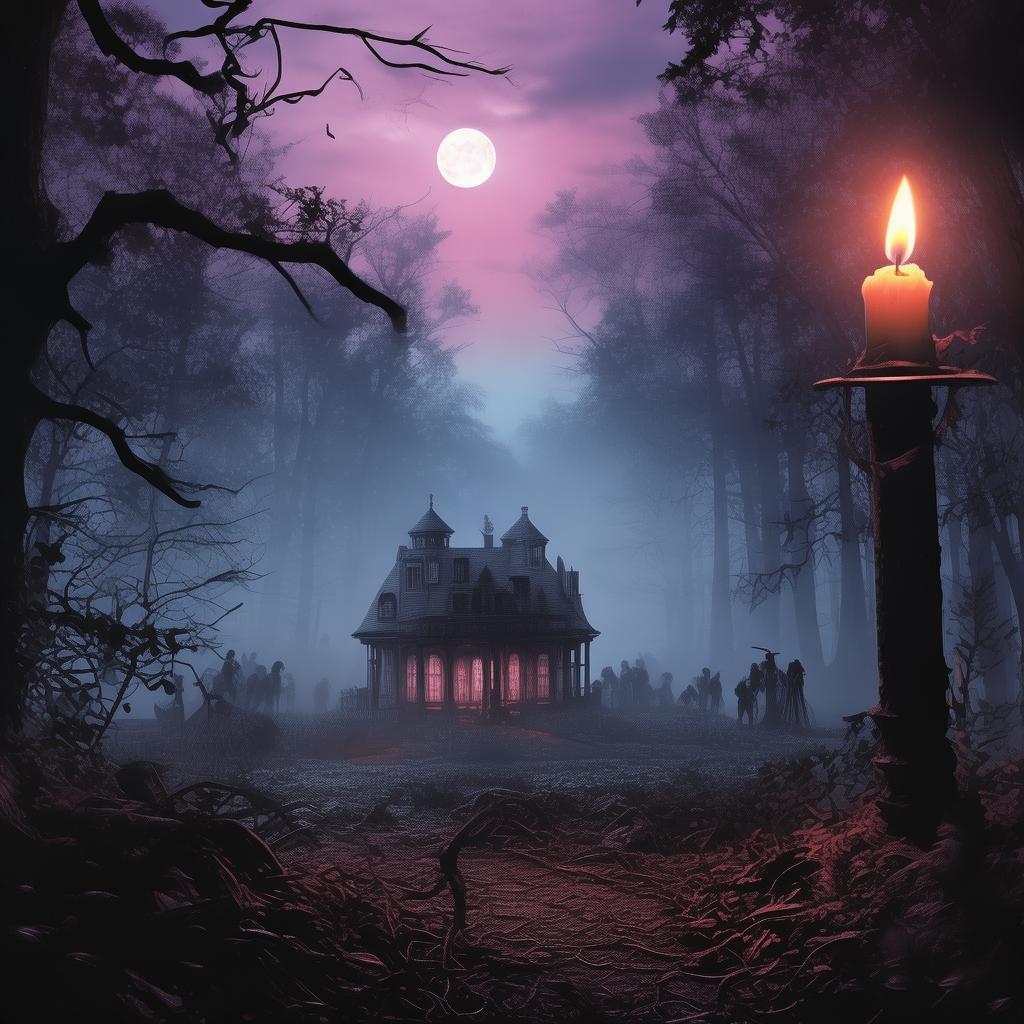The Lhasa Ghosts' Ballad
In the heart of the Tibetan plateau, where the sky seems to touch the mountains and the air is thick with the scent of pine and the distant calls of mythical creatures, there lay a village shrouded in mystery and folklore. This village, known as Lhasa, was said to be haunted by the spirits of the ancestors, and its people spoke of a ballad that had been sung through generations, a tale of love, betrayal, and the eternal yearning of the dead.
The ballad spoke of a princess who had been cursed by a jealous spirit, her soul forever bound to the village, her love for a forbidden suitor never to be realized. The story was one of heartache, and it had been passed down from ancestor to ancestor, each adding their own twist to the tale.
In the 21st century, a young scholar named Tenzin was drawn to the allure of Lhasa. His curiosity was piqued by the ballad's cryptic lyrics, and he decided to set out on a journey to uncover the truth behind the story. With a backpack filled with books on Tibetan history and folklore, Tenzin arrived in Lhasa, ready to explore the village's enigmatic past.
The village was a quaint collection of stone buildings, each with intricate wood carvings that seemed to whisper ancient tales. Tenzin met with the village elder, an elderly man with a twinkle in his eye that spoke of many a secret. The elder listened intently as Tenzin explained his quest, and then he shared a story that would change Tenzin's life forever.
The elder spoke of a princess named Drilma, a beautiful woman who had been cursed by a jealous spirit after she fell in love with a humble herdsman named Champa. The spirit, bound to the land by an ancient treaty, had decreed that Drilma's soul would never rest until the love of her life was avenged.
Tenzin, driven by the ballad's haunting lyrics, decided to search for the herdsman Champa. He ventured into the surrounding mountains, where the air grew colder and the sky darker. His search was relentless, and after several days of wandering, he stumbled upon a hidden cave in the heart of a frozen valley.
The cave was a labyrinth of stone, its walls etched with the symbols of ancient Tibetan deities. As Tenzin ventured deeper, the air grew colder, and the shadows grew longer. He knew that he was close to finding Champa, but he felt an overwhelming sense of dread.
Finally, he reached a small chamber at the heart of the cave, and there, hunched over a pile of ancient scrolls, sat an old man with long, graying hair. Tenzin's heart raced as he recognized Champa, his face etched with lines of sorrow and regret.
"Champa," Tenzin whispered, "I have come to help you break the curse."
Champa looked up, his eyes filled with a lifetime of unshed tears. "The curse is not breakable by man," he said. "It is a contract with the spirits, a price paid for the love that was forbidden."
But Tenzin was determined. He began to read the scrolls, seeking any clue that might help him understand the nature of the curse and find a way to break it. The scrolls were filled with arcane symbols and ancient spells, and as he deciphered them, he realized that the key to the curse lay in the princess's heart.
Back in the village, Tenzin discovered that the curse had a personal connection to him. The elder had told him that his own ancestor, a great scholar of the land, had been the one who had cursed Drilma in a fit of jealousy. It was his ancestor who had forbidden Drilma and Champa's love, thus binding their souls to the land.
With this knowledge, Tenzin understood that the curse could only be lifted by the blood of his ancestor's descendants. He made a vow to himself to break the curse, to free the souls of Drilma and Champa, and to honor their love.

The day of the curse breaking was one of celebration and sorrow. The villagers gathered around as Tenzin offered a sacrifice, a ritual that had not been performed for centuries. As the smoke rose from the flames, Tenzin felt a surge of power, a connection to the ancestors and the spirits that had been long forgotten.
The next morning, as the first light of dawn broke over the village, Tenzin walked to the edge of the plateau, looking out over the land that had been bound by the curse for so long. He whispered a silent prayer, and then he turned and walked back into the village, leaving the curse behind.
The ballad of Drilma and Champa was no longer sung in the village. The spirits had been freed, and the land was once again filled with the sounds of life and love. Tenzin had become a hero, a savior who had freed the souls of the past, and his journey had become a legend that would be told for generations to come.
In the end, Tenzin returned to his studies, but he carried with him the lessons of love and forgiveness, the power of forgiveness, and the strength to face the shadows of the past. The Lhasa Ghosts' Ballad had come to an end, but its legacy would live on in the hearts of all who heard it.
✨ Original Statement ✨
All articles published on this website (including but not limited to text, images, videos, and other content) are original or authorized for reposting and are protected by relevant laws. Without the explicit written permission of this website, no individual or organization may copy, modify, repost, or use the content for commercial purposes.
If you need to quote or cooperate, please contact this site for authorization. We reserve the right to pursue legal responsibility for any unauthorized use.
Hereby declared.









